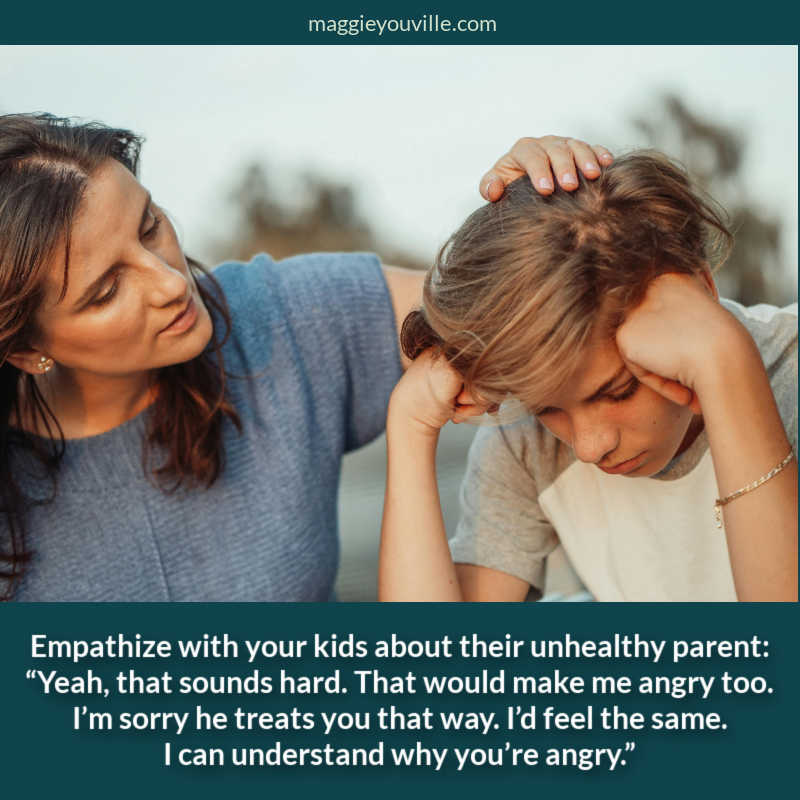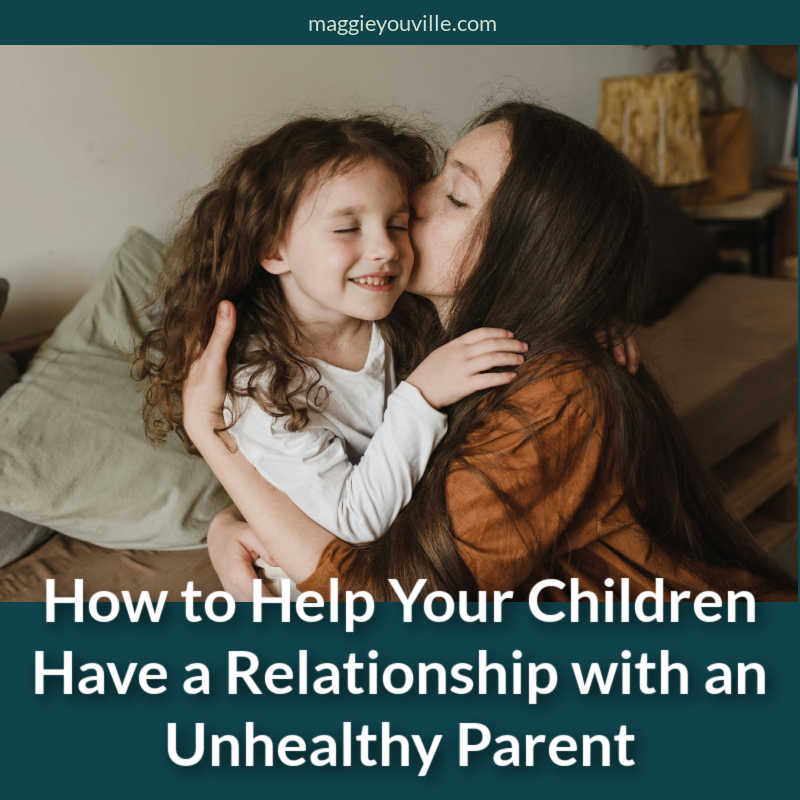One of the hardest things about leaving my abusive ex-husband is the effect it has had on my children. I am not sorry I left him, because that effect has not been negative, but it has been difficult and confusing. While I’ve told my children I will no longer see their dad or live with him because of how he treated me, I also tell them they’ll keep seeing him regularly.
While I try to hide the conflict between my ex-husband and myself from my children, I know they are still aware of this conflict. This puts them in a difficult position, as they want both their parents to be happy and often don’t understand the conflict or the causes of it. All of this can make it confusing for our children to have a relationship with two parents who don’t have a relationship with each other.
If you are also struggling to help your children have a relationship with their abusive dad (whether you are still together or not), here are my tips.
Listen to Them
My oldest daughter is an oral processor, so when she’s angry at her dad, she rants. This often happens while we’re driving to her dance lessons or late at night when her siblings have gone to bed and we can hang out on her floor together. Mostly, I just listen, and nod, and say, “Yeah, that sounds hard. That would make me angry too. I’m sorry he treats you that way. I’d feel the same. I can understand why you’re angry.”
It’s important for our children to feel heard and seen. Her dad has often devalued her feelings. She learned to hide all emotions with him, because if she started to cry when he was lecturing her, he’d threaten, “Stop crying or I’ll give you something to cry about!”
When my kids need to rant, I make myself present. I don’t offer solutions. If I can, I make us tea or find us chocolate. I offer hugs and fuzzy blankets and I simply listen and empathize.
Above all, listen to them: listen with compassion, with sympathy, with love, and without judgement. Encourage them to talk. Give them permission to be angry. Hold them when they need comfort and reassurance. Help them understand that forgiveness–when they are ready–is not a feeling. It is a choice. ~Dennis and Kay Flowers, Catholic Annulment, Spiritual Healing

Encourage Moving On
Carolyn encourages her daughter not to get stuck in complaining about her dad. She will give her daughter some time to rant and vent, and then she’ll say, “I’ve listened to you talk about this for ten minutes. I can’t do anything about this situation; what can you do for yourself? If your dad starts talking to you like this again, what are you going to do about it? How can you stand up for yourself? What do you need to do in this situation?”
She can then help her daughter brainstorm ideas or again, listen and validate. If the conversation circles back into complaining and negativity, Carolyn again encourages her daughter to move on: “I have validated you. This is the tenth time you’ve said this. Now we need to let this go. How can we let this go?”
Carolyn says she might get goofy in front of her daughter, to try to use silliness and humor to help her let go and move forward. My oldest daughter often turns on an episode of her favorite TV show just to chill after an encounter with her dad. Other activities like crafting and coloring, bouncing on a trampoline or going for a bike ride, or playing a game may also help.
Do Not Engage in the Complaining
Carolyn says it’s very important to set a boundary with your children that you will not complain about their dad. She tells her daughter, “I will listen to you and validate you, but I will not complain about your dad with you. My relationship with your dad is different than your relationship with your dad, and I don’t want my experience to affect your relationship with your dad.”
Redirect from the behavior to how that behavior made your child feel. We want to call out healthy and unhealthy behaviors or to try to love the sinner while hating the sin.
For example, Carolyn’s ex-husband once dropped their 14-year-old daughter off at the store to get some gluten-free food for herself. He left her shopping for 45 minutes. Because Kim has dyslexia and dysgraphia, she called Carolyn to try to figure out what was gluten-free and how much it cost and what she should get for herself. When her dad returned to pick her up, he yelled at her for what she’d found and how much it cost and told her she was selfish for just buying food for herself.
Carolyn realized Kim’s dad had set her up for failure. He hadn’t given her a budget for the food or any guidelines for what to buy and sent her into the store by herself. Carolyn explained to Kim why this wasn’t a healthy situation. They discussed what to do next time her dad asked Kim to find some gluten-free food for herself: she could ask him for a budget and some guidelines about what to get.
When discussing their dad’s behavior with her children, Carolyn is careful to ask, “Why did that behavior make you feel that way?” instead of “Why did Dad make you feel that way?” This way, she removes Dad from the discussion so they can look at the behavior and learn a lesson about healthy behavior and how nobody should be treating them that way. Carolyn may say, “It would be wrong for me to do that too.”
Own Mistakes
I’m well aware of the mistakes I’ve made as a mom, and I own those. I’ve apologized to my children for times when I haven’t heard them or when I’ve gotten angry at them because I was stressed out over something else.
I’ve also apologized to them for times when I’ve said something unkind about their dad. Court order aside, there’s a difference between listening to them ranting about him and ranting about him myself. I save my rants for my safe people, and I do my best not to say anything negative about their dad, no matter what they say about him.

Find Other Supports for Them
While I do my best to support my children, I know there are numerous reasons why I can’t meet all their needs. One of those is the court order between my husband and I that governs how we co-parent and what I can and cannot do or say. I’ve been honest with my older children that this court order governs my behavior (not theirs), and that I have to do certain things because of it.
My older children have therapists whom they have seen bi-weekly since I left their dad. I’ve put time into speaking with their therapists, finding the right therapists, and getting them to and from appointments.
Family counseling is highly recommended. With compassionate therapy, your entire family can grow in empathy for each other, becoming more like Christ, our great example of love and forgiveness. ~ Dennis and Kay Flowers, Catholic Annulment, Spiritual Healing
I also make sure they have other mentors in their life. These are close family and friends who are trusted by both of us, who know our situation, and who can speak truth and love and blessing into their lives. I’ve never asked them or their mentors what they talk about, but I try to make sure the mentors know enough about our life to support them and be there for them.
Among these supports is their school community. I ensure the school has a copy of each court order. I encourage my children to advocate with their teachers for their needs, whether that’s more time for a test or support in working with a particular classmate. One side effect of abuse is that we don’t ask for help (because none is given by the abuser) and don’t learn to speak up for ourselves, so I try to help my children see that there are people here for them, whether at school, church, or in our family.
Leave a Reply